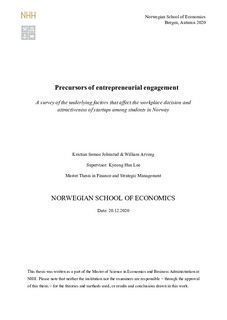| dc.description.abstract | Norway struggles with a low degree of innovative activity, even though it is ranked as one of
the world’s best countries to establish new businesses. It is well established that startups have
scarce resources in their first years and naturally have challenges in competing with established
companies when recruiting skilled employees. This study aims to determine how startups can
become more attractive when recruiting or retaining employees, given capital restrictions. This
is done by examining how personal characteristics, background and financial compensation
affect entrepreneurial intention. In this context, the entrepreneurial intention is defined as
«creating a business as a founder and working as an employee at a startup company»,
contributing to a better understanding of Norway’s lack of innovative activity.
An online survey was distributed to master’s students enrolled in Engineering and Economics
degrees in Norway. The participants were asked to answer questions that were both in line with
earlier proven frameworks and others based on earlier scientific literature. The results were
further analysed using descriptive statistics, t-tests, multivariate analysis of variance, and probit
regression models. The results showed a significant difference between respondents who were
planning to work within startups and others. Individuals with startup intentions have
significantly lower risk aversion. Among the personal characteristics, we found significant
differences in five traits and four skills. Workplace environment factors, like flexibility and
autonomy, were more important for participants with entrepreneurial intention. The location of
the company was negatively correlated with respondents who planned to participate in startups.
Males and students with families whose income is below average were more likely to
participate in startups. Moreover, financial compensation can make startups more attractive,
whereby option agreements make it possible for startups to recruit or retain students in Norway,
even when not offering competitive salaries. Furthermore, we recommend that startups increase
their exposure to students, as both earlier experience and affiliation are positively correlated
with startup intention. | en_US |
